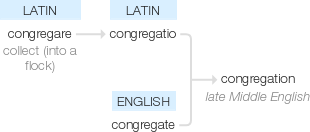Congregation
late Middle English (in congregation (sense 2, sense 3, sense 4)): from Latin congregatio(n- ), from congregare ‘collect (into a flock)’ (see congregate).
wiktionary
From Old French congregacion, from Latin congregātiō, itself from congregō(“to herd into a flock”). Adopted c.1340, by the English Bible translator William Tyndale, to render the Ancient Greek ἐκκλησία(ekklēsía, “those called together, (popular) meeting”) (hence Latin ecclēsia) in his New Testament, and preferred by 16th century Reformers instead of church.
etymonline
congregation (n.)
late-14c., congregacioun, "a gathering, assembly, a crowd; an organized group, as of a religious order or body of scholars; act of congregating," from Old French congregacion (12c., Modern French congrégation) and directly from Latin congregationem (nominative congregatio) "an assembling together, union, society," noun of action from past-participle stem of congregare "to herd together, collect in a flock, swarm; assemble," from assimilated form of com "together" (see con-) + gregare "to collect into a flock, gather," from grex (genitive gregis) "a flock" (from PIE root *ger- "to gather").
Used by Tyndale (1520s) to translate Greek ekklesia in New Testament in the sense "an assembly of persons for religious worship and instruction," also "the Christian church in general." The word also was used by Wycliffe and other Old Testament translators in place of synagoge on the notion of "the whole body of the Hebrews, as a community, gathered and set apart for the service of God. (Vulgate uses a variety of words in these cases, including congregatio but also ecclesia, vulgus, synagoga, populus.) Protestant reformers in 16c. used it in place of church; hence the word's main modern sense of "local society of believers" (1520s).
